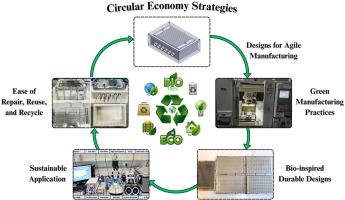在微型散热器开发中实施循环经济原则:技术-经济-可持续性分析
IF 10
1区 环境科学与生态学
Q1 ENGINEERING, ENVIRONMENTAL
引用次数: 0
摘要
随着环境压力的增加和成本的波动,迫切需要可持续的制造解决方案。本文通过整合循环经济原则、新兴技术和绿色制造实践,研究了微型散热器的可持续产品开发策略。该研究分析了中英混合生产模式,比较了能源效率、成本节约和环境影响方面的策略。混合方法通过在内部生产更简单的组件而外包复杂的部件来平衡经济、生态和资源消耗目标。结果显示,碳排放量减少19%,能源节约29%,成本降低43%。可持续设计、绿色制造和报废管理进一步促进了环境效益。机器学习模型验证了节省成本的结果,R2值超过0.98。最后,该研究提出了一个可持续混合智能框架(SHIF),以证明混合制造作为未来微型散热器生产的可持续解决方案的可行性。本文章由计算机程序翻译,如有差异,请以英文原文为准。

Implementing circular economy principles in micro heat sink development: A techno-economic-sustainability analysis
Sustainable manufacturing solutions are urgently needed with rising environmental pressures and cost volatility. This paper investigates sustainable product development strategies for micro heat sinks by integrating circular economy principles, emerging technologies, and green manufacturing practices. Analysing a UK–China cross-case hybrid production model, the study compares strategies in terms of energy efficiency, cost savings, and environmental impact. The hybrid approach balances economic, ecological, and resource consumption goals by producing simpler components in-house while outsourcing complex parts. Results show a 19 % reduction in carbon emissions, 29 % energy savings, and 43 % cost reduction. Sustainable design, green manufacturing, and end-of-life management further contribute to environmental benefits. Machine learning models validated the cost-saving outcomes, achieving R2 values exceeding 0.98. Finally, the study proposes a Sustainable Hybrid Intelligence Framework (SHIF) to demonstrate the feasibility of hybrid manufacturing as a sustainable solution for future micro heat sink production.
求助全文
通过发布文献求助,成功后即可免费获取论文全文。
去求助
来源期刊

Journal of Cleaner Production
环境科学-工程:环境
CiteScore
20.40
自引率
9.00%
发文量
4720
审稿时长
111 days
期刊介绍:
The Journal of Cleaner Production is an international, transdisciplinary journal that addresses and discusses theoretical and practical Cleaner Production, Environmental, and Sustainability issues. It aims to help societies become more sustainable by focusing on the concept of 'Cleaner Production', which aims at preventing waste production and increasing efficiencies in energy, water, resources, and human capital use. The journal serves as a platform for corporations, governments, education institutions, regions, and societies to engage in discussions and research related to Cleaner Production, environmental, and sustainability practices.
 求助内容:
求助内容: 应助结果提醒方式:
应助结果提醒方式:


